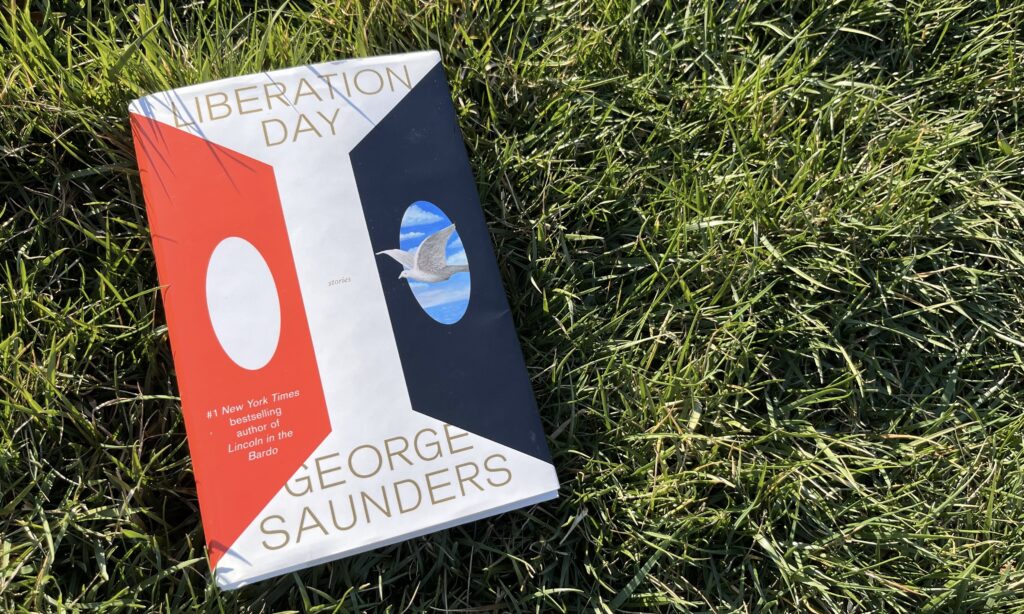When George Saunders’ last collection of short stories, The Tenth of December, came out, I read it to my now husband on our second date. We had spent the afternoon on a long bike ride around Charlotte, and soon found ourselves sprawled on a quilt with wine and charcuterie and a good book. We overlooked a sparkling pond. It was early October. He laughed at all the right bits, and I knew I was falling in love.
In this new collection, nearly a decade later, Saunders continues to play to many of his strengths. His short stories generally fall into one of two genres, which I’ve come to think of as either The Monologue or Weird Work. The Monologue stories are character-centered and focused on at least one voice. They showcase Saunders’ deftness with intimate, third-person stream of consciousness—and no one does it with a greater spirit of generosity or wit. The Monologue employs long, fully-anecdotal sentences to reveal the hypocrisies and frustrations of ordinary human life. They often end with unexpected introspection.
The Weird Work stories are more challenging. It usually takes a few pages to learn the rules of an utterly unique world that feels one degree shy of dystopian. Characters exist only to work, and their jobs are usually performative. They feel trapped, forced to perform for a hostile or apathetic audience. It’s the Weird Work genre, I think, which put Saunders on the map. The stories are longer, stranger, harder to orient yourself to, but the ultimate pay-off is huge. The endings leave you breathless.
The stories in Liberation Day are split about half and half between the genres, but his tone and themes have shifted. Where before Saunders’ stories were ultimately redemptive, tender even, now there is more uncertainty, cynicism. The characters are often ignorant of the truth of their situation, unable to fully act on feelings of love, and escape proves dangerous, if not deadly. These characters struggle between action and inaction, uncertain where their loyalty will lie when the revolution comes (it always comes). Standing up for causes and fighting for those they love (or hardly know), despite fear and weakness, is nothing new for Saunders’ characters. But now there is a longer denouement in many of these stories: what damage is done when we do choose sides? Is our world too complex for clean fights? Do we all lose something, even when justice (sometimes) prevails?
Three stories (all Weird Work, incidentally) in Liberation Day are especially notable for their resonance with our current world. The title story, perhaps the strangest—and best—he’s ever written, describes a small group of “Speakers,” who are essentially brainwashed musical puppets. Bound to a wealthy family’s wall, they sing historical epics for the family’s friends. Like I said, weird work. The uprising comes in an extraordinarily violent scene, but it’s hard to know what we as readers even hope for as an outcome. We certainly don’t cheer for the captors, but what future is imaginable for the survivors?
In “Elliot Spencer,” a corporation “reprograms” down-on-their-luck people so they can plant them as violent protesters at political rallies. Their speech is limited to vitriolic stock phrases. You need only replace said corporation with “radicalizing YouTube algorithm” and—oof. This story does have a more lyrically optimistic ending, which I was grateful for, where poetry and the natural world begin to regain their footing.
In “Ghoul,” Brian works at a Hell-themed amusement park, where he plays the uncelebrated role of “Squatting Ghoul.” Imagine if Heironymous Bosch designed It’s a Small World. Initially, the set-up reminded me a lot of Saunders’ “Pastoralia” from his 2000 collection, where a man lives and works in a caveman exhibit. But once we go backstage, “Ghoul” takes many dark turns, revealing the true Hell—public sex and murder by mob are commonplace and truth is stored like bodies. Towards the end, Brian asks, Is this world we have made a world in which lovers may thrive?
I can’t imagine reading that line back in the fall of 2013 and feeling much resonance. Sure, I was falling in love and the whole world seemed vibrantly hopeful, come what may. But it was a different world back then. Who would deny it? And now—as we barrel into this third decade of the millennium—I can’t decide whether I’m more disappointed in Saunders for succumbing to some of that dark cynicism out there, or grieved that his great mind has actually named a gathering truth.
Lovers may still thrive in our world. I stand by that. But read the collection. Because it’s the right question to keep asking—and Saunders asks a lot of the right questions.

